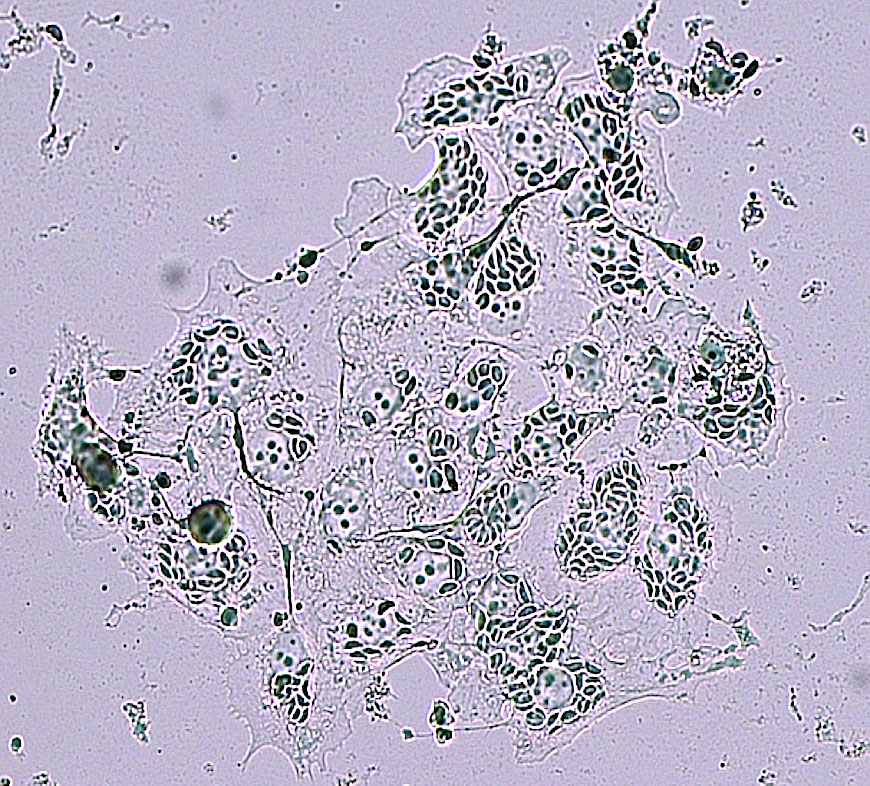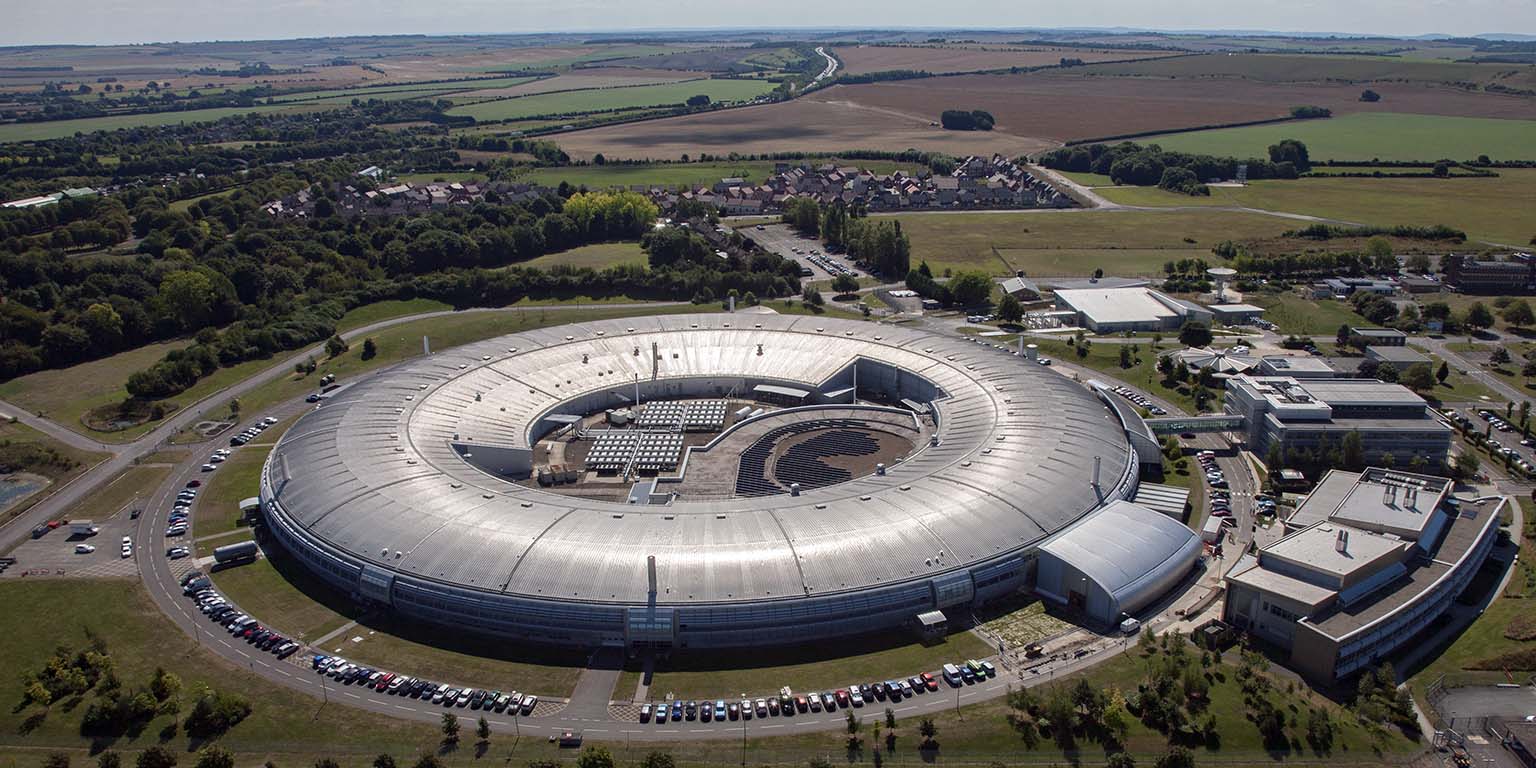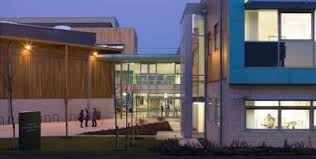Friday, 24 May 2019
Important new clues about how a common parasite found in cat faeces invades the human brain have been revealed by a team of scientists, using cutting-edge infrared microspectroscopy analysis.
Up to a third of the world’s population is infected with Toxoplasma gondii – a microscopic, single-celled parasite which can be passed from animals to humans through ingestion of poorly cooked meat or exposure to infected cat faeces.
The parasite can cause toxoplasmosis – a potentially dangerous infection, particularly in pregnant women and immunocompromised individuals (e.g. AIDS). It also causes eye problems and has even been linked with schizophrenia.
The research is front page story on the Royal Society of Chemistry’s journal, Analytical Method.
 Light microscopic graph showing a bunch of human cerebrovascular endothelial cells riddled with parasites growing within them.
Light microscopic graph showing a bunch of human cerebrovascular endothelial cells riddled with parasites growing within them.
Widespread worldwide infection
Parasitologist, Dr Hany Elsheikha, from the University of Nottingham’s School of Veterinary Medicine and Science, said: “Toxoplasma gondii is an extremely nasty parasite and although it can be latent in many people with no obvious ill effects, it can be life-changing and life-threatening in certain cases. At the moment there is no vaccine and the anti-parasite drug arsenal is limited so we were very keen to investigate new potential avenues for early detection and better treatment for patients infected with this deadly parasite.
“Interaction between host cell and Toxoplasma gondii parasite is a spectacular feat of bioengineering, wherein complex networks of metabolic pathways are hijacked by the parasite to promote its own growth, which is amazingly orchestrated. The pathways and molecules identified in our study play key roles in host cell physiology and responses to challenges by this parasite."
Our findings lay the groundwork for the discovery of novel therapeutics to slow the progression of infection and enhance host immune defences by controlling key metabolic pathways.
 Diamond Light Source, Oxfordshire
Diamond Light Source, Oxfordshire
Under the infrared spotlight
Dr Gianfelice Cinque, Principal Beamline Scientist for the Multimode InfraRed Microscopy And Imaging (MIRIAM) beamline B22 at Diamond Light source, said: “Using Diamond synchrotron radiation for infrared spectroscopy (microFTIR), a much brighter light than in conventional IR microscopes is delivered at the sample. This provides a much more sensitive microanalysis of biological cell machinery and specific molecular fingerprinting of the infection process at single cell resolution.
“I am very happy that our beamline teamwork has helped to address such an important medical challenge to improve understanding of the biochemical changes that occur in the blood brain barrier endothelium between a few hours and up to 2 days after Toxoplasma gondii infection. This critical information has revealed important molecular events required to shape a permissive cell microenvironment for growth and survival of Toxoplasma gondii. This research outcome and the use of IR microanalysis method could be exported and help with other types of brain disease.”
 School of Veterinary Medicine and Science, University of Nottingham
School of Veterinary Medicine and Science, University of Nottingham
The study has shown that microFTIR analysis is a highly effective tool to reveal any biological and chemical changes within infected cells as the parasite replicates in the host.
The findings provide new insights into how Toxoplasma gondii remodels the biochemical composition and metabolism of the host cells it infects, by decreasing the protein and increasing the lipid and nucleic acid content of infected host cells.
This could be considered a step forward towards the development of infrared biomarkers as a quantitative, highly molecular sensitive and specific way of characterising biomedical tissue and health status of patients.
Story credits
More informationis available from Dr Hany Elsheikha via email hany.elsheikha@nottingham.ac.uk
Notes to editors:
About the University of Nottingham
Ranked 24 in Europe and 15th in the UK by the QS World University Rankings: Europe 2024, the University of Nottingham is a founding member of Russell Group of research-intensive universities. Studying at the University of Nottingham is a life-changing experience, and we pride ourselves on unlocking the potential of our students. We have a pioneering spirit, expressed in the vision of our founder Sir Jesse Boot, which has seen us lead the way in establishing campuses in China and Malaysia - part of a globally connected network of education, research and industrial engagement.
Nottingham was crowned Sports University of the Year by The Times and Sunday Times Good University Guide 2024 – the third time it has been given the honour since 2018 – and by the Daily Mail University Guide 2024.
The university is among the best universities in the UK for the strength of our research, positioned seventh for research power in the UK according to REF 2021. The birthplace of discoveries such as MRI and ibuprofen, our innovations transform lives and tackle global problems such as sustainable food supplies, ending modern slavery, developing greener transport, and reducing reliance on fossil fuels.
The university is a major employer and industry partner - locally and globally - and our graduates are the third most targeted by the UK's top employers, according to The Graduate Market in 2024 report by High Fliers Research.
We lead the Universities for Nottingham initiative, in partnership with Nottingham Trent University, a pioneering collaboration between the city’s two world-class institutions to improve levels of prosperity, opportunity, sustainability, health and wellbeing for residents in the city and region we are proud to call home.
More news…